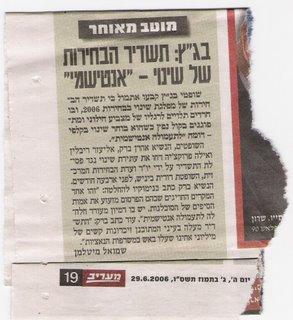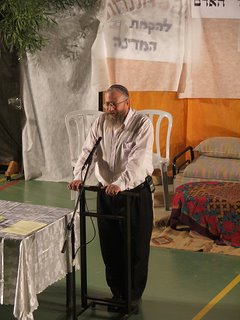One Scott Davis has had his letter published in the New York Times today.
Here it is:
Hamas knows full well "the reality of the world the Palestinians live in."
The Palestinians are ruled by an occupying power, denied full rights in the occupier's country and in their own lands.
Every meaningful facet of life for them is controlled by Israel.
If our great country were invaded and occupied by the Soviets during the cold war, I highly doubt that the citizens of our great nation would not fight back. Homemade rockets versus missiles isn't a fair fight, but it's all the Palestinians have.
Let's not forget that the West Bank and Gaza aren't nations. This is not one country attacking another. The French resisted the Nazis, the Algerians resisted the French, and the Jews who founded Israel resisted British occupation.
Now, as we all know, the Jews resisted British occupation but they didn't blow up buses and restaurants with civilians inside; they didn't attack schools and kindergartens; they didn't kidnap teenage hitchhikers - and I could go on and on.
Even the King David operation (btw, the Begin Center is conducting a two-day conference on the occasion of the 60th anniversary since the action) was directed at the hotel's southern wing which had, since 1938, been expropriated by the Mandate authority for use as an army command center as well as the offices of the Mandate bureacracy.
So Scott Davis attempts a sleight-of-pen trick and compares occupation resistance of one kind to an evil other kind.
Who is Scott Davis?
I did a search and my educated guess is is that he is the author of
this book, "The Road from Damascus, A Journey Through Syria" and that he's involved in
"Bridge Between Cultures".
And what is "Bridge Between Cultures"?
Bridge between the Cultures is a response to confrontation between the United States and the Arab and Islamic world following the September 11th attacks. Bridge between the Cultures consists of a series of books published by Cune Press as well as a wide-ranging public education project.
Bridge between the Cultures is a public education project sponsored by Cune Press and its partners.
One of their books is
Searching Jenin: Eyewitness Accounts of the Israeli Invasion 2002, Edited by Ramzy Baroud and Prefaced by Noam Chomsky. Chomsky? Yikes!
And what is the essence of this book? It is:
A searing testament to Israeli brutality and Palestinian resilience, spirit, and grace under pressure. This book explains what happened and how it affected the residents. It includes forty-two testimonies of Jenin survivors gathered by Palestinian journalists.
Bridge of Cultures has several messages and #4 is:
American policy toward Israel is unfair to Palestinians. If the situation were reversed, if Americans were living in Palestine, would they put up with the current situation? Would they be happy with events since 1948? Americans have little idea of the rough treatment that Israel has handed out to Palestinians, the constant stream of indignity and death.
Americans do not realize that the Israeli “get-tough” policy, backed by the US, only empowers radicals on both sides.
Americans think of Israel as a democracy. But most Americans have never stopped to think if there is a contradiction between the notion of a Jewish state and democracy. Is it fair that, say, a Samoan who converts to Judaism has the “right to return” to Israel, whereas a Palestinian whose family had lived in Palestine for 1,700 uninterrupted years until the 1948 war does not have this right?
Here's some more background:
Davis was dismayed that in the entire country there was not a single press that published books sympathetic to Arab and Islamic culture (although one or two very small presses did publish political books).
Davis also was dismayed at the conglomeratization of US book publishing—a trend that puts thoughtful authors and talented editors on the street in favor of commercial writing, much of it rubbish.
Davis noted that the two problems were related. The extreme commercial emphasis of book publishing narrowed the subjects that were considered possible for books if they were to reach their earnings goals. Formula books and name authors blocked the channels that, in previous years, might have allowed unusual subjects and new authors to win a following.Here's Scott Davis'
e-mail address in case you want to ask him if he is indeed the Scott Davis who wrote the letter or that I'm mistaken.



















